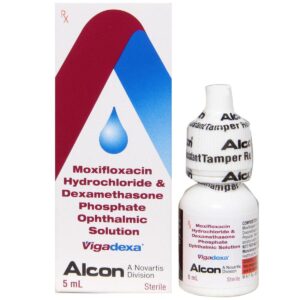MOXIFLOXACIN + HYDROCHLORIDE + DEXAMETHASON
Moxifloxacin: Moxifloxacin is a fluoroquinolone antibiotic that is used to treat different types of bacterial infections. It works by inhibiting the activity of enzymes called DNA topoisomerases, which are responsible for unwinding and repairing DNA during bacterial replication. By inhibiting these enzymes, moxifloxacin prevents the bacteria from multiplying and eventually leads to their death.
This drug is commonly prescribed for respiratory tract infections such as pneumonia and sinusitis, as well as skin and soft tissue infections, and certain sexually transmitted infections like gonorrhea. It is also effective against intra-abdominal infections and complicated urinary tract infections.
The dosage of moxifloxacin varies depending on the severity and type of infection being treated. It is usually taken orally as tablets or administered through intravenous infusion. The recommended dose for most infections is 400 mg once a day, taken with or without food. The duration of treatment typically ranges from 5 to 14 days, depending on the specific infection and the patient’s response to therapy.
Like all medications, moxifloxacin may cause certain side effects. Common side effects may include nausea, diarrhea, headache, dizziness, and stomach pain. Less commonly, it can cause a rash, itching, and photosensitivity (increased sensitivity to sunlight). In rare cases, moxifloxacin may lead to severe, potentially life-threatening adverse reactions such as tendonitis or tendon rupture, nerve damage, liver problems, and allergic reactions. It is important to discuss any unusual or severe side effects with a healthcare professional.
Hydrochloride: Hydrochloride is not a specific drug, but rather a designation used to denote the salt form of a drug that contains hydrochloric acid. Therefore, I will provide information about a common drug, Sertraline Hydrochloride, which is a selective serotonin reuptake inhibitor (SSRI) used to treat depression, obsessive-compulsive disorder (OCD), panic disorder, social anxiety disorder, and post-traumatic stress disorder (PTSD).
Mechanism of action:
Sertraline Hydrochloride works by increasing the availability of serotonin, a neurotransmitter in the brain. It inhibits the reuptake of serotonin into the presynaptic cell, thereby increasing serotonin levels in the synaptic cleft and enhancing neurotransmission.
Use:
Sertraline Hydrochloride is primarily used to treat depression and its associated symptoms. It is also effective for managing anxiety disorders, such as OCD, panic disorder, social anxiety disorder, and PTSD.
Dose:
The starting dose of Sertraline Hydrochloride for adults is typically 50 mg once daily. The dosage may be increased by the healthcare professional based on the individual’s response and tolerance, up to a maximum of 200 mg per day. The medication is usually taken orally with or without food.
Side Effects:
Common side effects of Sertraline Hydrochloride may include nausea, diarrhea, insomnia, drowsiness, dizziness, dry mouth, sweating, sexual dysfunction (such as decreased libido and difficulty achieving orgasm), and weight changes. It is important to note that some individuals may experience an initial worsening of symptoms before feeling the full therapeutic effects of the medication. Additionally, Sertraline Hydrochloride may increase the risk of suicidal thoughts and behaviors, especially in children, adolescents, and young adults.
As with any medication, it is essential to consult a healthcare professional for proper diagnosis, dosage, and monitoring during the use of Sertraline Hydrochloride or any other drug.
Dexamethason: Dexamethasone is a synthetic corticosteroid drug that is often used in medical treatment due to its potent anti-inflammatory and immunosuppressive properties.
Use: Dexamethasone is commonly prescribed for various conditions such as allergies, asthma, rheumatoid arthritis, skin disorders, certain types of cancer, and potentially life-threatening adrenal insufficiency (Addison’s disease). It is also sometimes used to reduce swelling and inflammation after surgery or to prevent and treat nausea and vomiting caused by chemotherapy.
Mechanism of Action: Dexamethasone works by binding to specific receptors in the body called glucocorticoid receptors. This binding modifies the gene expression and reduces the production of various inflammatory substances, suppressing the immune system’s response and reducing inflammation.
Dose: Dexamethasone is available in various forms, including tablets, injections, eye drops, and creams. The dose and duration of treatment depend on the specific condition being treated and the individual patient’s response. Dosage should always be determined by a healthcare professional and should not be self-administered or altered without medical guidance.
Side Effects: Like all medications, dexamethasone can have side effects, although not everyone experiences them. Common side effects may include nausea, stomach upset, increased appetite, weight gain, mood changes, difficulty sleeping, and increased susceptibility to infection. Long-term use or high doses of dexamethasone may lead to more severe side effects such as osteoporosis, glaucoma, cataracts, high blood pressure, diabetes, thinning of the skin, and increased risk of infections. It is important to discuss any concerns or potential side effects with a healthcare professional before starting dexamethasone treatment.

